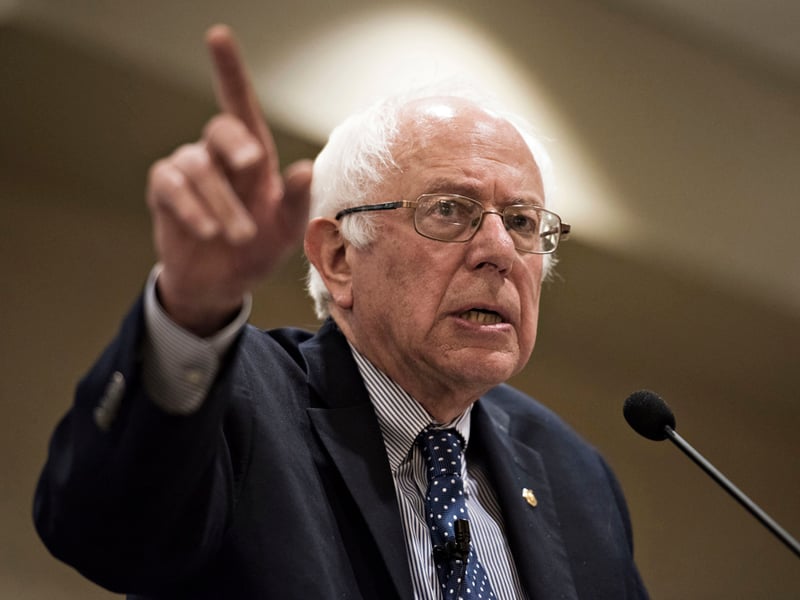Bernie Sanders wants Wall Street to pay off America's student debt.
Wall Street, predictably, says that's a bad idea.
Patent self interest aside, Wall Street has a point, economists say. Even before the Vermont senator and Democratic presidential hopeful formally
made his proposal to cancel $1.6 trillion in student debt and make public colleges free by levying a tax on trading, analysts have warned that it could make markets more volatile and that the costs — much like President Donald J. Trump's tariffs — would ultimately be borne by American households.
For politicians looking to burnish their everyman credentials, Wall Street and its billions in profit can be a tempting target. Plans for a financial-transactions tax have been debated by the European Commission for almost a decade, and U.S. lawmakers have revived it in recent months. While Mr. Sanders trails in polls of Democratic presidential hopefuls heading into this week's debates, he's fueling an idea that would threaten to disrupt how everyone from high-frequency traders to pension managers operate.
More:
'Wall Street Tax Act' will land on Main Street investors
"In 2008, the American people bailed out Wall Street. Now, it is Wall Street's turn to help the middle class and working class of this country," Mr. Sanders said in his statement.
Industry groups and experts say the cost of the levy would be shouldered by Main Street investors: either directly as trading houses pass along the expense in higher fees and wider spreads, or indirectly through lower returns in mutual fund and pension accounts.
More:
Top Democrat proposes revival of plan to eliminate capital gains loopholes
It's an argument the industry has made before when facing proposals that could crimp revenue, but outside experts have found it has some merit. An International Monetary Fund study in 2011 suggested that transaction taxes initially target the finance industry, but eventually firms pass on higher costs to customers.
Since about 52% of U.S. households have a retirement account, according to the Federal Reserve, more than double the 22% of households with student debt, Mr. Sanders' plan could end up taxing half the country to forgive debt held by less than a quarter of Americans.
"Can someone tell this guy @BernieSanders that these taxes are paid by mom and pop investors, mutual fund investors, folks with pensions and 401Ks," tweeted Larry Tabb, founder of research firm Tabb Group.
The potential for higher costs and lower volumes has the financial industry spooked. Lobbying groups for the big banks, high-frequency trading firms and asset managers have spent years detailing the downsides of the proposal. Trading firm Virtu Financial Inc. listed a potential financial-transactions tax in between lawsuits and technological changes in the list of risk factors atop its latest annual report.
More than $1 trillion in stocks and bonds trade on a typical business day in the U.S., the Congressional Budget Office says, with trillions more in derivatives changing hands daily. Sales and trading operations and market infrastructure services produced almost $300 billion in revenue in 2017, according to McKinsey & Co.
The Vermont senator's proposal would tax stock trading at 50 basis points and bond trading at 10 basis points, and apply a half-basis-point tax on derivatives transactions. The estimated $2.4 trillion in revenue it would raise would then be used to cover the $2.2 trillion cost of eliminating all U.S. student debt and undergraduate tuition and fees at public colleges, according to Mr. Sanders.
That revenue figure is up for debate. A 2017 study published by the European Central Bank found that a tax on equity trading in France decreased trading volume by around 10% and fell short of generating expected revenues.
A financial-transactions tax of 10 basis points would generate $777 billion of additional revenue over the next decade, the Joint Committee on Taxation said last year. The tax would probably increase volatility, and increase the Treasury's cost to issue debt, according to the Congressional Budget Office. Household wealth also would decline with the decrease in asset prices, which could lower consumption.
Applying taxes to stock, bond and derivatives trades could also change investor behavior, according to Andrew Silverman, a Bloomberg Intelligence government analyst.
"Fifty basis points on stock trades would severely crimp liquidity," said Steve Sosnick, chief strategist at Interactive Brokers. Market participants might move to options for the lower tax rate, making them more liquid than the underlying stock, he said. "A tail that wagged the dog that much would become very unstable."
The economic threat of increasing student debt has become a hot topic on the campaign trail, and Mr. Sanders' Democratic rival Elizabeth Warren has also introduced a plan to forgive outstanding loans.
Student debt loads have tripled since 2007, eclipsing car loans and credit cards as Americans' second-largest source of household debt behind home mortgages, Federal Reserve data show. About one in nine borrowers is at least 90 days late on payments, the highest delinquency rate among any form of household debt, according to the Federal Reserve Bank of New York.
Policy makers such as Federal Reserve Chairman Jerome Powell and executives such as JPMorgan Chase & Co. CEO Jamie Dimon have worried aloud that young Americans' indebtedness is hurting the housing market, where most Americans build their wealth. Blackstone Group Executive Vice Chairman Tony James is pushing for a new model of financing college that does away with student loans.
Still, that didn't generate much appetite for Mr. Sanders' plan on Wall Street.
"Every time a significant transaction tax has been tried, it has either been gutted or eliminated due to its failure to collect anything close to projected revenue and its impact on capital markets," tweeted Dave Weisberger, who's held senior trading roles at firms including Two Sigma Securities and Citigroup Inc.







